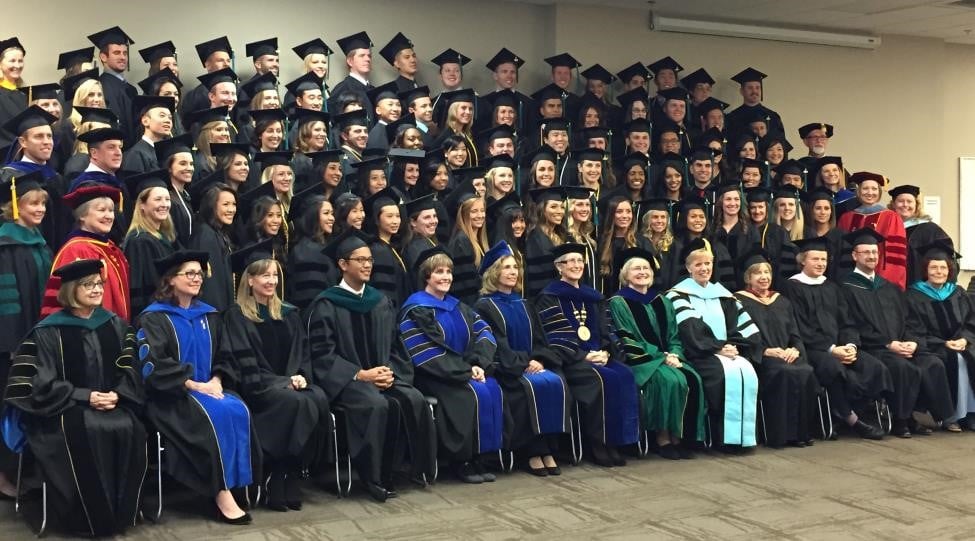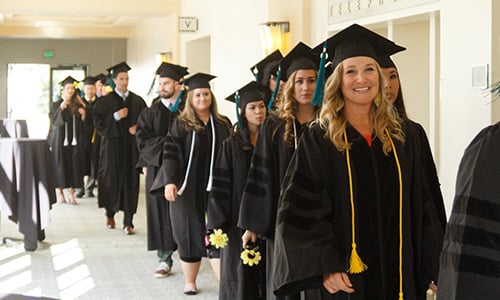 Contributing faculty member Chuck Kimmel, MA, LAT, ATC, is past president of the National Athletic Trainers’ Association (NATA), which is honoring him with the 2018 Eve Becker-Doyle Leadership Award. He teaches Leadership in Athletic Training in the Master of Health Science program.
Contributing faculty member Chuck Kimmel, MA, LAT, ATC, is past president of the National Athletic Trainers’ Association (NATA), which is honoring him with the 2018 Eve Becker-Doyle Leadership Award. He teaches Leadership in Athletic Training in the Master of Health Science program.
How Can Volunteering in Athletic Training Help Your Career?
Athletic training is a young profession that is rapidly establishing its place alongside other healthcare fields. One effect of that is there are more leadership and service opportunities than there were when I first started volunteering with my professional association. That first volunteer role was a turning point for me, and it can be for others at any stage in their careers.
I happened into my first volunteer role. The person in the job before me did it, so we had all the files. My first mentor suggested I take it on, so I said yes and became Exhibits Chair for the Southeast Athletics Trainers’ Association. I volunteered in that role for 10 years. It wasn’t seen as glamorous but it was a lot of fun, and I met people who were deeply vested in developing and sharing goods and services to improve people’s practice. It also gave leaders and members of the association a chance to know me and measure what kind of volunteer I was for future opportunities. I never would have predicted that starting as Exhibits Chair I would one day become president of NATA.
Where can Athletic Trainers Volunteer for Experience?
That first volunteer job was back in the 1980s when there were just district and national organizations. My district didn’t have an executive board or real committees, just elected officers. Now our national structure has grown to where there are around 50 committees with about 11 members on each. That’s 550 volunteer opportunities! Plus, many of the districts have committees that mirror the national structure. Then you have state and local groups that are blossoming. Those organizations have become powerful because of the impact of state-level legislation.
Any athletic trainer who wants to get involved just needs to find an area that interests them and make themselves available. If you don’t get chosen right away, make yourself available again. When you do find yourself in a leadership position—in your professional association or in your workplace—here is some advice that served me well.
How to Make the Most of Athletic Training Volunteer Opportunities
- Treat every opportunity like the most important one you’ve ever had. That will help you enjoy it even more and demonstrate your dedication. I do the best job I can no matter what it is.
- Be available. If you called me or emailed me, you’d hear back. If it was about something I couldn’t give an answer to right away, I’d let you know that I’d received your email, that I was thinking about a response, and that you’d hear back from me. All that was done within a day at most or sooner. Those you represent need to know you are responsive and that you do in fact work for them.
- Listen more than you speak. Often I avoid saying the wrong thing by listening. Even when people weren’t happy with what we were doing, they gave us good ideas for improvement. Sometimes listening strengthened my beliefs, because the other person wasn’t selling me on their position on an issue.
- Look people in the eyes. When you and I are talking, I lock onto your eyes. I won’t look at anybody else. Everyone’s been at meetings where people’s eyes wander as if they want to find the next best person to talk to. I don’t allow that to happen. I look at the person I’m talking to so they know they’ve got my attention. I don’t unlock until we’re done.
- If you make a promise, you keep a promise. If you tell somebody you’re going to do something, you do it. I always have a pad of paper and a pen so I can keep notes of things I need to do when I talk to people.
- Leave the role better than you found it. Set this as your goal from the beginning. Whether I have been successful or not at this, history will judge, but it sure has been fun to try. It is rewarding to then look back and see how things have continued to develop and what current leaders are accomplishing.
At this stage in my career, I now get to share my experiences with athletic trainers in the Master of Health Science program at the University of St. Augustine for Health Sciences. It is inspirational to see them dive into leadership, examine their philosophies, and develop new ones that they share and discuss. The culminating work is a mentorship plan, and students tell me that after the course, they are going to present their plan to their supervisor, so they can put it into action.
That’s what education should be about—teaching things that are relevant and can improve a situation. It’s leaving the profession better than we found it.








